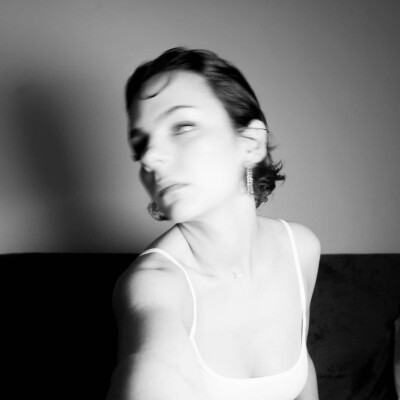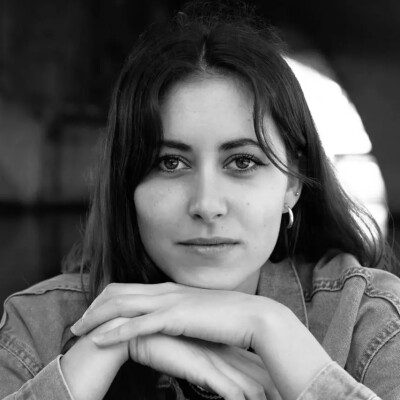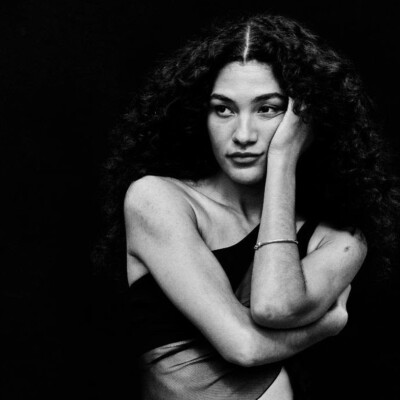- Speaker #0
I don't know if I think in terms of that, in terms of like, I want to write an R&B song or a jazz song. I'm influenced by all of it.
- Speaker #1
Okay.
- Speaker #0
Whatever comes out.
- Speaker #1
Sounds like something to use.
- Speaker #0
I like it.
- Speaker #2
Hey everybody. Aujourd'hui, j'ai eu la joie de vous parler de Samara Joy. J'ai eu la grande chance de la rencontrer dans les backstage de Jazz à Vienne, au contact de l'équipe... Decay Records France. And we were able to talk about jazz, composition, and especially authenticity and its relationship with musicians. What was really interesting was to have his vision of jazz and his vision of writing music in our contemporary era, with the point of view of an artist who has been awarded the Grammy more than once. It was the big night of closing of the Jazzabienne festival, the All Night Jazz. In the first part, there was Elia Vir, who we were also lucky to be able to interview. Hello, Laurie Vaille. The interview is also available on the podcast. And with Samara, we had the opportunity to discuss during the balances. And it was quite pleasant to exchange naturally through a conversation. Through the conversation, I was able to appreciate even more to what extent Samara has no trouble going beyond the genres, mastering aesthetics. and studied rigorously each style, each musical language, from jazz to gospel to R&B. And then, in a gospel and soul universe, she was taught how to make music in its purest form. In this episode, you won't only listen to a singer who was doubly rewarded at the Grammy Awards at the time, now she has accumulated new rewards, but you will also appreciate a young artist of 23 years old, authentic and just as sensitive, fully devoted to the music of her life. when it comes to studying the greatest in jazz, gospel or R&B. The exchange with Samara Joy is of course in English. It is available in subtitled videos on YouTube. I invite you to go see this video. Although this video does not reflect the entirety of our exchange that you can listen to here on the podcast. And for those who wish, I have a little quote translated from our exchange that I share with you. I want to sing and not have to create new standards. Simply write.
- Speaker #0
We listen.
- Speaker #1
So your accolades on the Grammy winning, you named me a big reporter. Do you know about Javi's music or him just at all? Yes. Yeah, yeah, yeah. And what I love the most about him is his relationship with his musicians. Very special, like a family. I met his drummer, Emmanuel Harbault, and really like, yeah, he's a this movement and I wanted to know a bit more about your musicians because I feel that's it seems important for you is it that family for you tell us about was the relationship with the musicians well I'm very happy to see that we all um at
- Speaker #0
the very at the very forefront of all of it is friends we respect each other I think that Having that relationship, it allows us to communicate better. It allows us to listen to each other. Because I think if we just came to the music like we're just coming to work or something like that, then yes. Personal, we would be allowed to be as creative or as open. So I think at the very least, you know, we've all spent a lot of time together over the past couple of months and we've gotten to know each other. Become really, really good friends. and even better collaborators because of that.
- Speaker #1
The alchemy. Did you meet them at college or after the album dropped?
- Speaker #0
I met him in college. Okay. And he was a bit older than me. He's a bass player. His name is Jackie.
- Speaker #1
All right. Hi, Jackie. Hello.
- Speaker #0
I'm a pianist and drummer. I both met. as a result of being in New York. Okay. Seeing them play and hearing about them from some of my own musician friends. All right. Not just the idea of wanting to put together. a band you know where each chair each room has their own creative voice and so they bring that into it instead of trying to um play a part i think that to play behind the singer a lot of love yeah it's like yeah we're all together with creative voices we're coming together and we're combining that yes building a sound together um
- Speaker #1
yeah How did you meet them? Was it in Open Mic Nights, in jam sessions?
- Speaker #0
The drummer, yes. The pianist, I had actually never met him before we played together.
- Speaker #1
Oh right, okay.
- Speaker #0
I heard of him, his name is Luther. I had seen some of my other friends playing with him, and honestly I was just like, let's try it out.
- Speaker #1
Let's try it out, yeah.
- Speaker #0
Let's see what happens. And it ended up working out really well.
- Speaker #1
Yeah.
- Speaker #0
he's really not only is he a really great person musically every day you know he's always talking about like the pianist that he's listening to and music that he's listening to and the passion thing that he's digging you know like that which is the same for all of them but um it
- Speaker #1
was nice to be able to take the risk and have it be have it pay off i like it i like it but it's just to me but we're gonna get to this uh just a little bit after um second about you This Open Mic Night and Jam Session, when you met the drummer, I was wondering because I saw in a previous interview that you performed your first original songs at Open Mic Nights. And I wanted to know if you recall the first song, your first original song you ever performed on stage. Pardon me, original songs,
- Speaker #0
yes. Yeah. Most things because if I do report it because it's so personal to me, I want it to be, I want it to sound good. I want it to be the best possible offering that I can give. And maybe that's not the right mindset to have because I don't know if it'll ever be perfect. I don't know if it should be. But yeah, I at least want to feel good about releasing it to people whenever I decide to do it.
- Speaker #1
okay all right not yet not yet soon soon and would it be jazz as well or will it be um i will be because i've seen your thread interview and you can sing like the so would it be still uh the jazz genre or would it be would it be anything like do you yeah
- Speaker #0
that in terms of like i'm gonna write an r&b song i'll write a jazz song i'm influenced by all of it okay so whatever whatever thing comes out might be a result of what i'm studying at the time like studying for example like the arrangements of do fiercely or all the brain also if i'm studying how they approach harmony and comes to later um the sound and listening to their sound and that's what's going to come out it's like what i've most been listening to yeah whereas like if i'm mostly just been listening to gospel over the past couple of months straight you know just listening to gospel artists and the way that there's their songs and then maybe that's basically come out but i think it just depends on what i'm what i'm what i'm studying what i'm listening to i'm intent does just mean to you
- Speaker #1
as a music, as a spirit, and why was that so important for you to sing traditional jazz and not contemporary jazz?
- Speaker #0
Well, it's tough because there are definitely a lot of sides to what is right and what is wrong. Is jazz a genre? Should we call it that? Is it dead? Is it alive? Does it follow the law? And it's just like... I don't know. I think Duke Ellington is contemporary. I think he was writing music way ahead of his time. I think there are composers today who are inspired by that and writing in that spirit, but with their own added flair and making it contemporary. I think for me, I don't consider myself seeing traditional or contemporary. I just I can only it's like. I'm 23 since 2023. I can't copy Ella Fitzgerald, copy Sarah Vaughan, because they had different influences. And they were coming up in a different time when music was being created. And so they're going to sing in a certain way and have certain repertoire. Whereas now, maybe there's a pressure to imitate that golden age, even though it can never be imitated. There's a pressure to, you know, for audience's sake, you know, to present. nostalgia and sing the same songs over and over again because that's what they know instead of writing they need to do something new so i think um at least with my place in all of it um i want to write i want to compose i want range i want to you know sing and not make new standards but just write you know i don't think that's when like i'm sorry to keep bringing them up but um you like Duke Ellington or even like a Max Roach, you know, when they were writing. I don't know that they were trying to create new stations or anything, but it was just their creative output, you know. They were growing as musicians and their music was like that. And so all this talk, you know, traditional and contemporary, it's like just listening to music.
- Speaker #1
Yes. Okay. Just for the text actually.
- Speaker #0
There's only a certain amount that you can ask from the public. Because we're kind of conditioned to put everything into a box. This sounds like this and this sounds like this. So I understand. But just from the outside looking in, when I first started listening to jazz, obviously I was like, yeah, this is, you know, it comes from a different time, different sound, recording sounded a certain way. Standards and so on were different. And I couldn't think of this gym so much. history and progress I don't want to say progress but just which has been added to Wayne Shorter yes so it's just you know I hope that it continues in a direction that is I don't want to say grounded in tradition because it's like okay I don't want to rant about this question but
- Speaker #1
it's the best answer you could give so yeah it's good
- Speaker #0
take away all the genres and stuff like that. You listen to me sing, and you're like, it doesn't sound like, you know, maybe her voice is developed, or it doesn't sound like she can sing in tune or anything like that. That's not a question of genre. That's not a question of traditional or contemporary. It's a question of my development as a singer, as a musician, period. You know? And so, contemporary jazz seemed like, you know, musicians who It's not that they are abandoning tradition. It's not that they are steering away or whatever. Maybe they're genuinely trying to make something new, but it sounds like they're not as developed as musicians as people were, you know, in a time like with Dizzy Gillespie or with Charlie Parker, when they were practicing all the time and they had the space and they had clubs and they had gigs. So. Maybe that's why there's such a debate between traditional jazz and the sound of it and the musicians who created that sound, even though they were being innovative even in that.
- Speaker #1
Yes,
- Speaker #0
exactly. Versus today, when it's like sometimes it seems like part of that soul is kind of missing and people just want to eat a poppy or they want to just play wild to get attention or get money or whatever. So I don't know. it could go on all day long but I guess for my part of it I want whatever I do to be authentic to me I'm influenced by jazz I'm inspired by jazz,
- Speaker #1
I'm inspired by I'm inspired by gospel and all of that combines the musician what you say sums up the idea of it goes beyond the product of a jazz album like the product of Anastasia as you say So that's, I think, one of the best answers I could receive. I like asking these questions, working with jazz players, working with jazz actors. So politics for me is like bullshit for me. And for me, it's more like a spiritual culture. Jazz is in everything. So I like the way you put the history. And the more you were talking, the more I could remember some of my favorite songs off of the album. and the instrument sort of is really like traditional music per se but your voice is really contemporary as well like we could identify ourselves as, you know, before in the 20s, singing something that is timeless. So kudos for this.
- Speaker #0
I hope that answer makes sense for you, like, when you watch it back. Because I was just rambling.
- Speaker #1
It does. It does. Just two last questions. Talking about nostalgia. One of my favorite songs of the album was Nostalgia, The Day I Knew, and Sweet Pumpkin. Was a... Was it original song, those standards?
- Speaker #0
Both of those, I guess I would consider jazz compositions.
- Speaker #1
Okay.
- Speaker #0
I feel like standards, they're mostly known as the American Songbook. The Great American Songbook. Yeah, yeah. And, you know, supposings like First Berlin and that kind of thing. Jazz compositions, they were actually written by jazz musicians. Oh, right. So Nostalgia was written by a trumpet clarinet, Fats Navarro. Oh, right. And I wrote lyrics to it. Okay. And it's kind of like a bebop melody, but I wrote the lyrics to the melody and the trumpet player solo. And Sweet Pumpkin was written by a jazz pianist, a pianist and accompanist named Ron Elbright. We worked with Nancy Wilson and Sarah Vaughan and Carmen McRae, and he wrote this song and the lyrics to it.
- Speaker #1
The lyrics are fire. I love the story. I feel really like it's like 50 years of relationship. And I love it. Most forensic and authentic song, Last Flash. I was amazed because just after your graduation, you decided on yourself that you would release a album. And most of jazz students don't release a song that early because of perfectionism, because I don't know. So what was, this was during the college time. during your college time and I know it is challenging so I wanted to know what was the most challenging during your years and what advice would you give to other jazz students or musicians for them to release their first album and realize it could be a real opportunity for their career it was to me I probably would have waited a while before I recorded my first album too but um
- Speaker #0
An opportunity came to work with a producer that I hadn't met before. All right. He's actually here now. His name is Matt Pearson. Okay. And we reported in October of 2020 with the plan to release this summer after I graduated and sign with an independent label in the UK.
- Speaker #1
Okay.
- Speaker #0
All right. Just kind of get the, first of all, get content out for people's reasons because I didn't have any songs for that. You know? So. I didn't have an album or anything on Spotify or Apple music. So that was the main goal. It's like to just, let's get some content out so we can start to build an audience. Yes. It's a music hour. And, um, from there, I kind of built after a while, I built a bit of a presence on social media. Okay. Um, but I think that's where a lot of people in my age are.
- Speaker #1
TikTok.
- Speaker #0
Instagram, TikTok. Yeah. It's nice to be able to perform for them online, and then they come out in person. But, camera.
- Speaker #1
Never mind. Never mind. It stopped anyway.
- Speaker #0
Oh, it stopped?
- Speaker #1
Yeah, yeah, yeah.
- Speaker #0
You recording? Yeah, yeah,
- Speaker #1
yeah. They're documenting. It's all right.
- Speaker #0
Cool. Yeah, I didn't think then. It would be as successful as it was, but I guess I would encourage students. You know, a lot of students, they're already posting online, trying to network and get gigs and stuff like that.
- Speaker #1
Yes.
- Speaker #0
I don't know. There's so much. I don't want to say there's so much misinformation for students, but it's really hard to try and make a name for yourself and be in a business. It's so hard to make a name for yourself. The advice that I would give would be to stay true to yourself, whatever that means for you. As people, I'm going to challenge anyway with each new experience. But it's just like staying true to yourself and understanding what you want and what you want to reach for and what your goals are. I feel like that allows you to have a clear vision when it comes to whoever you want to work with or whatever it is that you want. Sure. It's to see standards on your life. Do it. If you want to build your own microphone, if you want to work with certain musicians. seek out those what it takes to make that happen but whenever you want don't be afraid to take the necessary steps to go out there and seek advice from people but at the end of the day it's your life and you have to copy what you do you know so don't try to copy my path don't copy somebody else's and your unique path that you're supposed to go on experiences that you're supposed to have those lives that you're supposed to have supposed to change with your gifts and your strengths that nobody else knows. So, and again, it's not just one. Sure, for sure. It takes all of our lives to find that out.
- Speaker #1
Thank you very much, Samara. It's been a real pleasure meeting you and have fun.
- Speaker #0
Thank you.
- Speaker #1
Have some rest, have some water.
- Speaker #0
Will do. Have some cream. Shoot.
- Speaker #1
They don't miss.
- Speaker #0
They got me.
- Speaker #1
They don't miss.
- Speaker #0
They got me.
- Speaker #1
And say hi to you musicians. And yeah, thank you very much.
- Speaker #0
I'd like to do for you a couple of songs. Well, first, we would like to do a song made popular by a great trumpeter named Fats Navarro. I will be leading this one. This one is for all of the beautiful couples in the house. It is called nostalgia. Yeah.
- Speaker #1
Looks like we made it.





